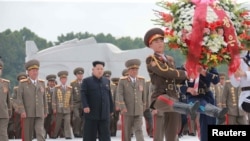In an apparent attempt to mend relations with Beijing, North Korean leader Kim Jong Un has paid tribute to the Chinese soldiers who fought for the North during the Korean War.
Ties between the two allies have cooled since late 2011, when Kim took power in the North.
The North’s state-run media Korean Central News Agency said Monday Kim sent a wreath to the cemetery of Chinese soldiers who were killed during the Korean War to mark the 62nd anniversary of the armistice that ended fighting in the war.
The cemetery is widely considered a symbol of the long-standing alliance between Pyongyang and Beijing. Paying tribute to the Chinese war dead has been a customary practice for North Korean leaders, but Kim skipped the tribute last year, which sparked speculation about the troubled relationship between Beijing and Pyongyang.
Last week, Kim praised the Chinese army for its role in the war in a speech at a national conference of war veterans in Pyongyang.
“I extend noble respect to those martyrs of the people’s army and the martyrs of the Chinese People’s Volunteers who laid down their precious lives during the sacred war they fought for the freedom and independence of the fatherland, and for peace,” Kim was quoted in a report carried by the North’s official newspaper Rodong Sinmun.
Yang Moo-jin, a professor at the University of North Korea Studies, told VOA Kim is extending an olive branch to Beijing. “I believe he is sending messages of reconciliation to Beijing to restore bilateral relations,” said Yang.
A South Korean official who asked to remain anonymous told VOA Kim’s apparent conciliatory gesture toward Beijing is worth noting, adding there have been no specific diplomatic developments between Pyongyang and Beijing.
But another official cautioned against reading too much into Kim’s move, saying it should not be taken as a direct diplomatic message to Beijing.
Kim’s comments followed visits by Chinese President Xi Jinping to the Chinese cities bordering North Korea. Some analysts see the Chinese leader’s move as Beijing’s show of interest in improving ties with Pyongyang.
Tensions have risen between China and North Korea after the North conducted the third nuclear test in February 2013, despite objections from Beijing. Relations have deteriorated after the high-profile of execution of Jang Song Thaek, the uncle of Kim who had close ties to Beijing. In July 2014, Xi visited South Korea, making him the first Chinese leader visiting the South before traveling to the North, which was seen as a snub to Kim.
In Seoul, there is a growing expectation among some analysts and government officials that the North and China might use anniversary ceremonies to improve ties.
China plans to stage a rare military parade in Beijing in September to commemorate the 70th anniversary of the end of World War II. The North is expected to hold an event in October to mark the anniversary of the founding of the ruling Workers’ Party.
Jee Abbey Lee contributed to this report, which was produced in collaboration with the VOA Korean service.




